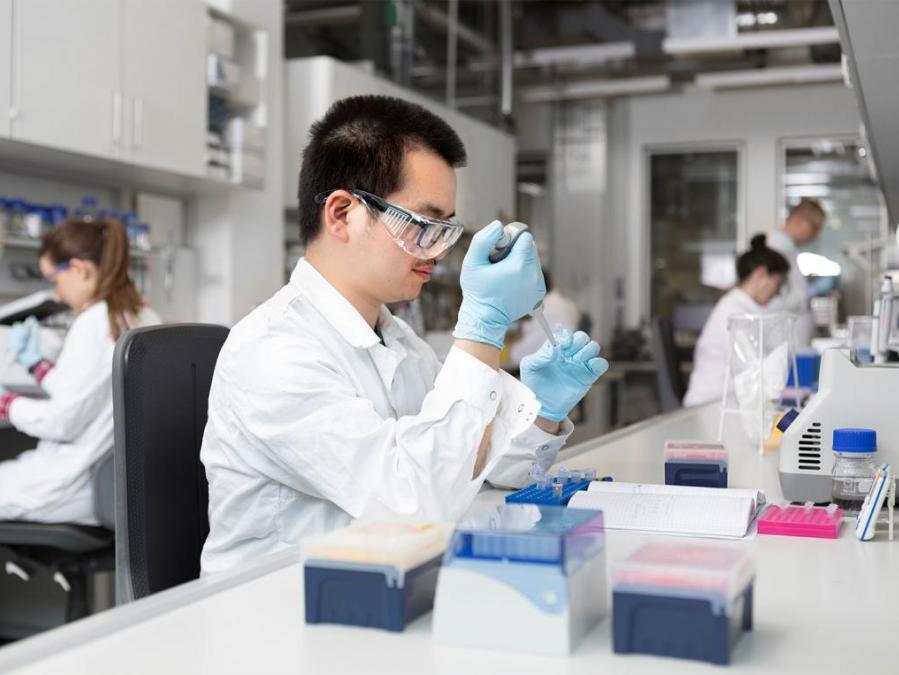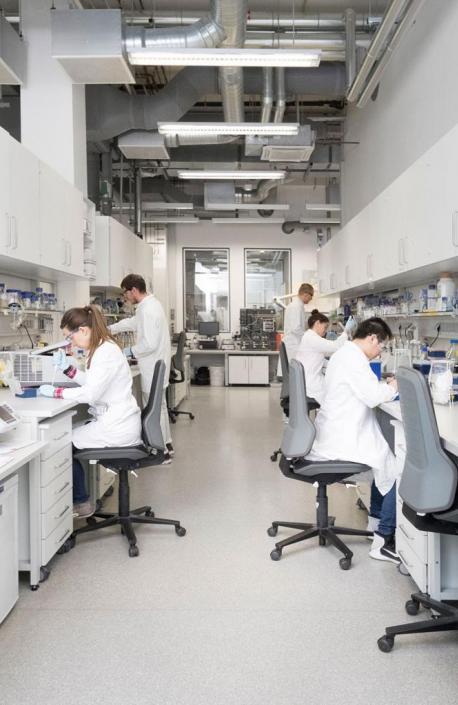PhD at the DWI
About 65 PhD students are currently researching within the five areas of competence of the the DWI – Leibniz Institute. They participate in the DWI-internal mentoring program and some of them are members of additional graduate schools and programs.


DWI Mentoring Program
All doctoral candidates of the DWI—Leibniz Institute for Interactive Materials are supported by the institute’s own Mentoring Program whose aims are to regularly and intensively promote doctoral projects as well as to ensure a realistic time planning and high-quality work of the doctoral students. Moreover, the Mentoring Program aims to advance institute-internal collaborations and interdisciplinary research at the DWI. Within the scope of the Program, two Mentors from two different fields of expertise are assigned to every doctoral candidate to promote efficient work on interdisciplinary research projects. During the doctoral study time (typically four years), there are three Mentoring seminars in which the attained scientific results and the total performance of the doctoral candidates as well as the quality of the Mentoring are discussed. Regular events such as the weekly Institute Seminar or the annual Doctoral Student Retreat also help to further the interdisciplinary exchange of knowledge and cooperation. Moreover, the participation of young scientists at various international scientific conferences is permitted and funded.
Max Planck School ‟Matter to Life”
The doctoral program at the Max Planck School Matter to Life will offer highly talented and motivated students a superior training in the fundamentals, methods and approaches in the rapidly developing field of Matter to Life. „What, exactly, is life?“, and „Can life-like processes, functions and objects be quantitatively simulated, predicted and created in the laboratory?“ are the overarching questions addressed in the curriculum and research training.
The Max Planck School Matter to Life is organized by Heidelberg University, Göttingen University, Technical University of Munich, Leibniz Institute for Interactive Materials at RWTH Aachen and different Max Planck Institutes. Faculty and researchers from diverse scientific backgrounds, but with overlapping research interests will mentor and teach the students which may then choose from over 40 of Germany’s most renowned and successful research laboratories to pursue their research in the emerging scientific area of Matter to Life. Current Bachelor's students with backgrounds in Chemistry, Biochemistry, Material Sciences, Molecular Systems Engineering, Physics, Molecular Cell Biology, Bioengineering, or a related subject are encouraged to apply to the Max Planck School Matter to Life.
Students holding a Bachelor's degree can apply to the 5-year B.S.-to-Ph.D. direct track program, where they will begin their first two years of study at one of our three partner Universities based on their specialization of choice:
Molecular Systems Chemistry and Engineering (Heidelberg University), Complex Systems and Biological Physics (Göttingen University), or Bioengineering (Technical University of Munich). The remaining three years of the program can be undertaken at any of the Faculty's laboratories.
https://www.maxplanckschools.de/de/matter-to-life
DFG-Graduiertenkolleg 2375 ´Tumor-Targeted Drug Delivery'
Drug delivery systems improve the efficiency of cancer therapeutic agents by slowing their degradation, prolonging blood circulation times, increasing target site accumulation, and protecting healthy organs. So far, various drug delivery systems have been developed and tested, but their full potential has not been fully exploited as yet. Exploiting this potential requires close, interdisciplinary collaboration at the interface between clinical practice, tumor biology, and chemical technologies.
The research training group seeks to develop drug delivery systems and new treatment strategies to treat tumors more effectively and reduce the side effects of agents. Innovative production processes are to be established that allow the efficient, reproducible production of drug delivery systems.
Furthermore, Inter- and intraindividual differences in tumor vasculature and tumor microenvironment will be correlated with site accumulation, penetration, and drug delivery system effectiveness. In addition, pharmacological and physical complementary treatments will be examined to increase tumor uptake and the effectiveness of drugs.
http://exmi.rwth-aachen.de/funding/grk-tumor-targeted-drug-delivery/
Graduate school Mechanobiology in Epithelial 3D Tissue Constructs (MEƎT)
The graduate school Mechanobiology in Epithelial 3D Tissue Constructs (MEƎT) trains doctoral researchers in the burgeoning fields of mechanobiology and tissue engineering. The doctoral researchers examine how mechanical stimuli regulate tissue morphogenesis and remodeling based on the hypothesis that the micromechanical niche determines cellular responses which in turn modify the cell's mechanical niche. Understanding and controlling this mechanobiological feedback cycle offers novel prospects for steering tissue morphogenesis and remodeling in order to interrupt pathological processes and produce functional tissue Substitutes Cell biology, biophysics and bioengineering must work hand in hand to unravel fundamental mechanobiological mechanisms. MEƎT exploits the unique constellation at RWTH Aachen University by bringing together engineers and life science researchers to provide an ideal basis for meeting this demand. The doctoral researchers leverage this constellation to learn about mechanisms governing tissue mechanics and development, and use this knowledge for developing tissue engineered biological systems. Such complex tissue models are urgently sought by the pharmaceutical industry and academia for drug screening, reduction of animal use and basic research.
https://me3t.rwth-aachen.de/index.html
Research Training Program within the SFB 985 “Functional Microgels and Microgel Systems”
The SFB brings together research groups from polymer science, chemical engineering and life sciences and focuses on microgels as a group of highly functional macromolecules. http://www.microgels.de
International Research Training Program 1628 SeleCa “Selectivity in Chemo- and Biocatalysis”
This International Research Training Program aims for an understanding of catalytic processes on a molecular level. It proposes to bridge the gap between chemical and biological catalysis in research and education by complementary research teams and to combine chemical and biological catalysis for future chemicals’ production by providing superior solutions for selective conversions and integrating underlying processes.
http://www.seleca.rwth-aachen.de/
ALERT
Prof. A. Herrmann coordinates the EU-funded training network ALERT, which deals with development of new biocides and antimicrobial surfaces.
http://novelantimicrobials.eu/
Center for Doctoral Studies, RWTH Aachen University
The Center for Doctoral Studies, CDS for short, is the center for providing continuing education and transferable skills training opportunities for doctoral candidates at the RWTH Aachen University, including PhD students at the DWI that are enrolled at the RWTH Aachen. The focus is on skills which are important for the doctoral studies and further career.
One of RWTH Aachen's goals is for its young researchers not only to possess excellent subject oriented skills but also a broad range of skills outside of their discipline. The CDS supports doctoral candidates with their career development.
